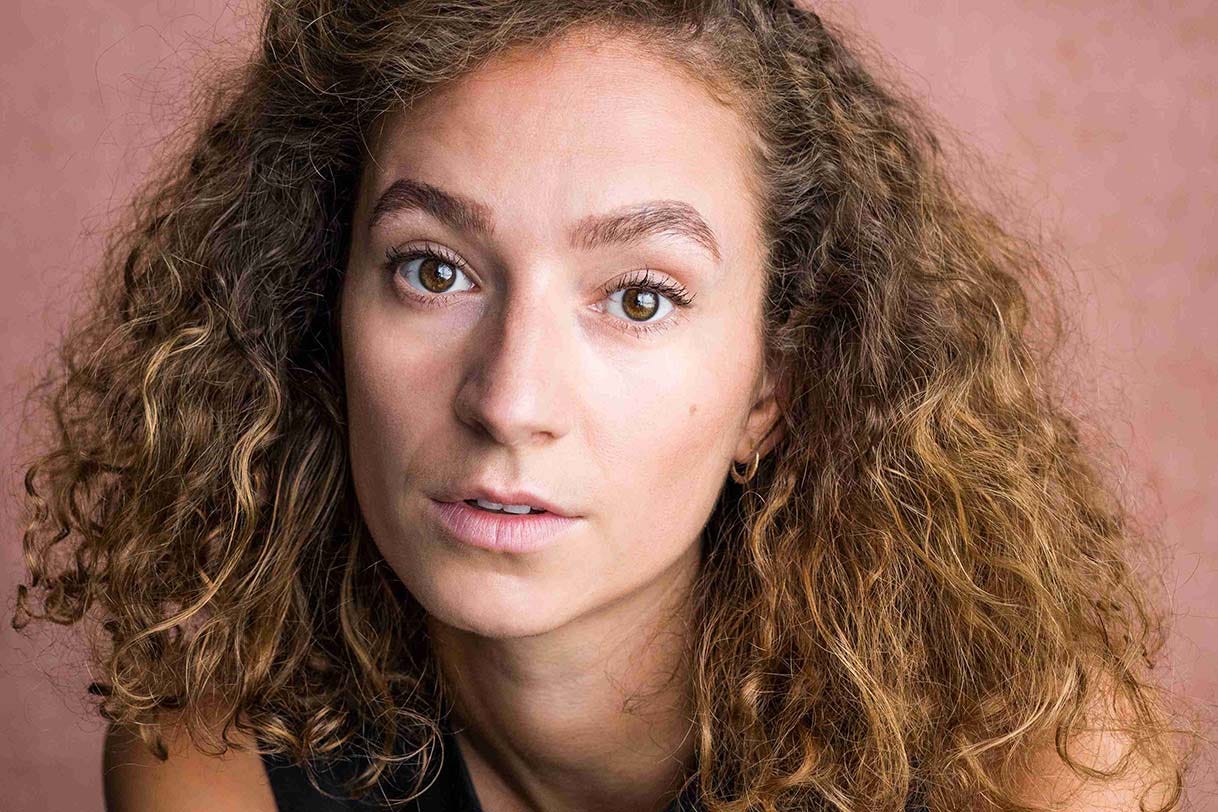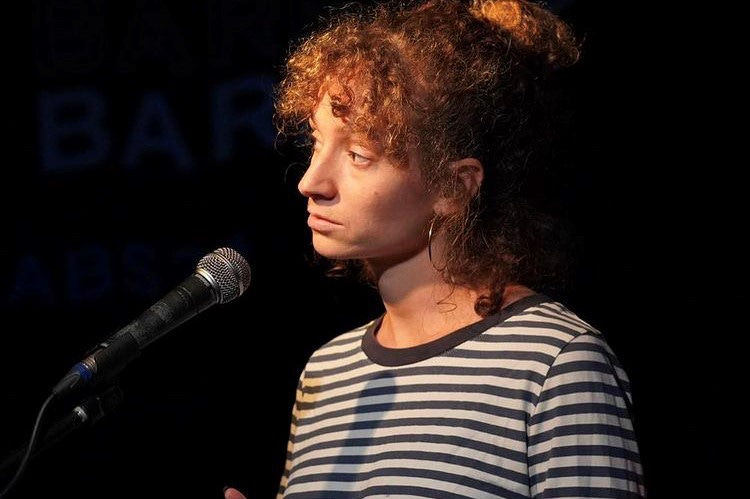Actor and writer Gemma Barnett makes spoken-word poetry shows.
The performer and poet on gig-theatre piece Agatha. Plus: details of promotional opportunities with The Crush Bar.
Hello, and welcome to The Crush Bar, a weekly newsletter about theatre written by me, Fergus Morgan.
Each issue features an interview with an exciting, emerging theatremaker - and gives them a chance to be explicit about where they want to go and what help they need to get there. Maybe you, reader, can give it to them, or put them in touch with someone who can.
You can read more about why I’m doing this here, and you can sign-up to get it delivered straight to your inbox using the button below…
Before this week’s interview, I want to quickly share something with you. At the start of the year, I announced that, in order to keep this newsletter going, I was going to be publishing the occasional promotional piece, alongside the regular interviews. The first of those were tied to VAULT Festival. That did not go to plan, but I am pushing ahead regardless!
Here is a PDF with some stats about this newsletter - number of subscribers, number of views, etc - plus a breakdown of the opportunities on offer, ranging from short shout-outs, to longer mentions, to entire issues. If you or your company are ever interested in using this newsletter to promote a show, a service, or anything else, just get in touch.
March 2020 was a difficult month for everyone, but it was particularly difficult for actor, writer and poet Gemma Barnett.
She had just finished a run of David Greig’s Dr Korczak’s Example at Leeds Playhouse, picked up an Offie Award for her performance in Tatty Hennessy’s A Hundred Words For Snow the previous Spring, and had three exciting auditions lined up.
“I felt like, ‘Wow, something is really happening for me,’” Barnett remembers. “Then we were suddenly in lockdown, and everything went into turmoil. My agent left. I went through quite a brutal break-up. I didn’t have a place to live. There was a lot of instability, and I had no work at all. I realised I needed another job fairly urgently.”
Barnett eventually found regular work as a receptionist at a GP surgery in Tottenham, and, stressful though it was as Covid-19 continued, it also provided her with structure, purpose and inspiration – so much inspiration that she ended up penning a poem about it, The Front Desk, and a longer, spoken-word piece, too, Bridge.
“I’ve never worked in such a poetic place in my life,” Barnett says. “I know that sounds wanky, but my colleagues are so resilient and brilliant, and the people that come through the door are such amazing characters. I don’t want to sugar-coat it. I’ve also received the most abuse I’ve ever received in my life, but I do think I have learned a lot about love and connection and care, too.”
The Front Desk went on to win a prize at the inaugural Poetry For Good competition, and Barnett performed Bridge at Theatre Deli’s Pandemic In The City festival in July last year. She is currently developing it into a short film, too, while simultaneously preparing to present her first, full-length play Agatha – a three-handed gig-theatre show about abortion, addiction, and female anger – at Pleasance London next week, where it was rehomed after the cancellation of VAULT Festival.
“Agatha has been in my brain for the past three years, and it’s been a real jigsaw puzzle to put together,” Barnett explains. “It’s inspired partly by my own family. My nana died a few years ago, and I only found out afterwards that she was denied an abortion in the 1960s, and sent to an asylum. It got me thinking about family, and memory, and how personal narratives can be a way of surviving.”
“I will be going back to my receptionist job at the surgery afterwards,” Barnett adds. “They are very understanding and supportive of me doing all this. One of the GPs actually helped me with the script to make sure I got some medical stuff right, and I think my manager has actually planned a little work trip for them all to come and see it.”
“I was so fearful for a while. Fearful of the industry. Fearful of the people in it. Fearful I wasn’t intelligent enough…”
Barnett grew up in Southgate in North London. She was “a very shy, very insecure kid”, but youth theatre groups helped her gain confidence as a teenager, and she went on to study drama and performance at the University of East Anglia.
“I loved it,” Barnett remembers. “We had such a wonderful year group of incredibly talented directors and designers and stage managers, who have continued to work together since. We did a lot of devising. Yeah, I think UEA is where I felt my most creative and confident. It’s where I realised I could make my own work.”
After graduating, Barnett co-created quirky comedy Goggles with fellow UEA graduate Josie Dale-Jones, AKA ThisEgg, and took it to the Edinburgh Fringe in 2016, before studying acting for a year at Oxford School of Drama. It did not suit her. “I felt more beaten down than built up,” she says, “and it took a while to get my confidence back.”
Barnett’s first job after leaving, though, suited her down to the ground: Lucy Jane Atkinson’s production of Tatty Hennessy’s one-woman play A Hundred Words For Snow, an elegantly constructed, mightily moving piece about a Rory, a teenage girl who journeys to the North Pole to scatter her father’s ashes. Barnett knocked it out of the park when she performed it at VAULT Festival in 2018, then again when it transferred to Trafalgar Studios in 2019.
“I remember reading that script and thinking, ‘I have to play this part,’” she remembers. “It was all about Rory’s wonderful but complex relationship with her dad, and I have a wonderful but complex relationship with my dad, too. The rehearsal room was really collaborative. It was lovely for my first job to be with such talented female artists.”
Barnett slotted in other roles around the two runs of A Hundred Words For Snow – Not Too Tame’s Cinderella, Hannah Nixon’s Lola, and Shakespeare In The Square’s A Midsummer Night’s Dream, plus a few short films – before lockdown left her doubting her future in the industry. Her job at the GP surgery, though, has given her the inspiration and energy to keep going, and to start pursuing her own projects.
“I was so fearful for a while,” she explains. “Fearful of the industry, fearful of the people in it, fearful that I wasn’t intelligent enough. The pandemic, though, bizarrely, has helped me realise that I don’t need anyone else’s permission to write, to perform, and to make my own work. Of course, I want to keep doing acting jobs, but I’ve realised that I am a much happier, healthier person when I’m doing my own stuff as well.”
What do you want to do?
My dream is that someone does see Agatha and gives it a longer run somewhere. That would be lovely. I also want to meet more collaborators, and I want to meet more female and non-binary producers, too, because I really hate using that side of my brain.
I want to keep acting in other shows, too. Please, cast me in something! I’ve never really played any Jewish roles, and I’d love the chance to explore that side of my identity. Oh, and I’d love to get some poetry published, too, and to do some more poetry gigs. I’ve done a couple of them recently and they are a lovely way to connect with audiences.
What support do you need to get there?
I respond very well to mentoring, so if anyone wants to help me with any of this stuff, then please get in touch. If someone was willing to sit down and help me write funding applications, that would be amazing, because I really struggle with that on my own. I’d like to get signed to a literary agency at some point soon, too.
How can people find out more about you?
I’m not on Twitter, but you can find me on Instagram. That’s where I share all my upcoming stuff. There are various bits and bobs I’ve done on YouTube, too, including The Front Desk and Bridge.
People can also come see Agatha at the Pleasance. And we’ve been working with Alliance For Choice in the development process, so if anyone wants to donate to a charity, they are a great one to give to.
Anything you can do to support The Crush Bar is hugely appreciated. There are three helpful things in particular: you can subscribe using the button above, you can share it, either on social media or by forwarding it to anyone who might be interested, and you can donate to my Ko-Fi account using the button below.
If you want to get in touch with me to ask about anything, or to suggest someone who deserves a shout-out in this newsletter, you can reach me on Twitter - I’m @FergusMorgan - or by simply replying to this email. That’s all for now. Back in a week. Thanks for reading.
Fergus Morgan




